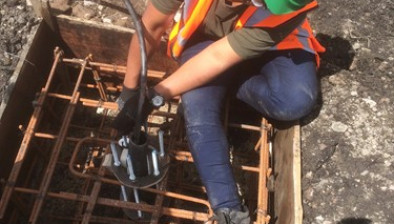Contingency plans take hold in wake of Carillion collapse

Clients and joint ventures partners of collapsed contractor Carillion have taken steps to begin contingency plans after the firm entered compulsory liquidation today.
An application was made to the High Court for a compulsory liquidation of the UK’s second largest construction company before opening of business this morning after talks with the UK government to save the company were unsuccessful.
The firm had been involved in the £745 million Aberdeen Western Peripheral Route (AWPR) and had contracts with Registers of Scotland, the Scottish Children’s Reporter Administration, West of Scotland Housing Association and NHS Greater Glasgow and Clyde among many others.
Network Rail awarded Carillion a contract last year to deliver platform extension works and the firm is also responsible for two facilities management contracts worth £158m with the Ministry of Defence (MoD) which cover 83 military sites in Scotland.
Contingency plans have now been put into effect with the hope to minimise disruption to the projects.
Galliford Try is in joint venture with Carillion and Balfour Beatty on the construction of the £550m section of the AWPR between Balmedie and Tipperty for Transport Scotland.
“The Scottish Government are in discussions with the liquidators and the UK government to support Carillion employees and secure the completion of contracts.”
Galliford Try said: “The terms of the contract are such that the remaining joint venture members, Balfour Beatty and Galliford Try, are obliged to complete the contract. Our current estimate of the additional cash contribution outstanding from Carillion to complete the project is £60-80m, of which any shortfall will be funded equally between the joint venture members. The companies will discuss the position urgently with the official receiver of Carillion and Transport Scotland, to minimise any impact on the project.”
A Transport Scotland spokesman reiterated the bypass project will be completed by the spring.
He said: “We expect that any impact on the AWPR will be mitigated by the fact that Carillion’s construction partners are joint and severally liable and as such, the other two construction partners remain fully responsible for the completion of the works.
“Aberdeen Roads Limited, the construction joint venture for the project, confirmed recently that they remain committed to the delivery of this project.”
Amey has incorporated joint ventures with Carillion to deliver the regional prime and national housing contracts for the MoD, through the Defence Infrastructure Organisation (DIO). These contracts maintain the MOD estate in the UK.
It said: “The terms of the joint ventures’ arrangements mean that Amey will continue the services now that Carillion has announced it is entering into immediate compulsory liquidation. Amey is committed to doing this and ensuring continuity of service to the DIO and MOD and the service men and women in the UK.
“For the past few weeks, Amey has been working on detailed contingency plans with the DIO and the Cabinet Office to ensure it can effectively continue to manage the contracts and these are being implemented today.
“Amey confirms it is fully prepared to continue the service obligation of the contracts without adverse effect on the employees of the joint ventures or the supply chain.”
Network Rail commissioned Carillion for both the Waverley platforms extension project and the electrification of the railway line through Shotts.
In addition, the firm was also contracted for platform works at Broughty Ferry and Aberdeen railway stations.

A Network Rail spokesman said: “We are activating our contingency plans as a result of this unfortunate news.
“We will be working closely with the administrators and Carillion’s management team to ensure projects that they are working on continue and that the supply chain is maintained for this important work.
“Our aim is to ensure that this news has as little impact as possible on our projects to grow and expand the railway network.”
Kier Group, which currently operates joint ventures involving Carillion on HS2 and the Highways England smart motorways programme, jobs, will now have to take them on alone or seek a new partner.
A Kier spokeswoman said: “We have put in place contingency plans for each of these projects and are working closely with clients so as to achieve continuity of service.
“Following today’s announcement and after a short period of transition for these contracts, we do not expect there to be an adverse financial impact on the group arising from these joint venture contracts.”
 Read more: ‘Procurement lessons must be learned’ after Carillion demise
Read more: ‘Procurement lessons must be learned’ after Carillion demise
The Construction Industry Training Board (CITB) said that it was “taking steps to secure the future of the 1,400 Carillion apprentices” by redeploying them to other firms.
CITB chief executive, Sarah Beale, said: “The news of Carillion entering insolvency is clearly a significant blow to the UK construction sector. While this will present the sector with a number of challenges, CITB’s priority is to do all it can to ensure that Carillion apprentices can continue their training so their skills are not lost.
“We have established a project team to work with the apprentices and will be offering in principle grant and apprenticeship transfer incentives to our employer base in order to retain these learners. We will be working closely with the ESFA, the official receiver and our network of college providers so that every possible support is in place to help these apprentices continue their training. We will be liaising with the official receiver with a view to contacting the apprentices as soon as possible.”
The Scottish Government said it is in talks to support Carillion employees and secure the completion of contracts in Scotland.
Cabinet secretary for the economy, Keith Brown, said: “Our first thoughts are with those Carillion employees who will be concerned for their jobs today and we are in discussions with the liquidators and the UK government regarding the measures they intend to put in place regarding private sector, Network Rail and UK govternment-backed contracts in Scotland to support Carillion employees and to secure the completion of these contracts.
“The Scottish Government has been working to manage or eliminate risks associated with Carillion’s difficulties since July last year and we have contingency plans in place for affected contracts, including the AWPR where the contract contains a mechanism for the remaining two joint venture partners to deliver the project and we expect that work to continue.
“I have spoken to the Secretary of State for Scotland this morning and my officials have also spoken with PwC to establish the situation and should it be necessary we stand ready to support for any affected employees through our Partnership Action for Continuing Employment (PACE) initiative which aims to minimise the time individuals affected by redundancy are out of work.”













